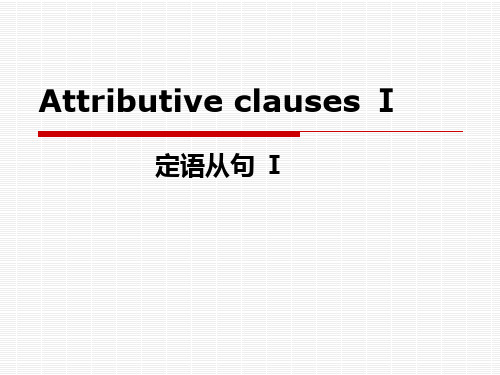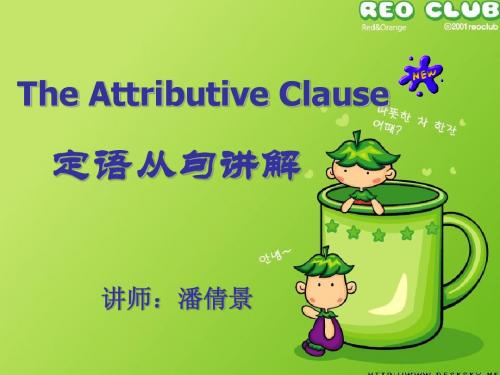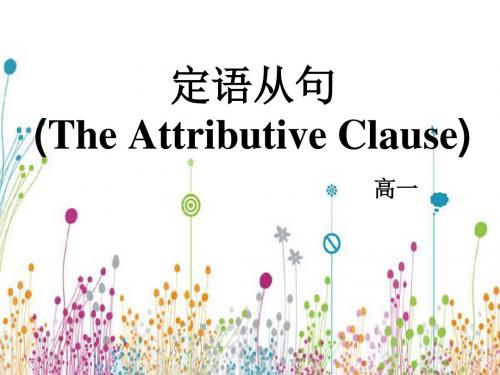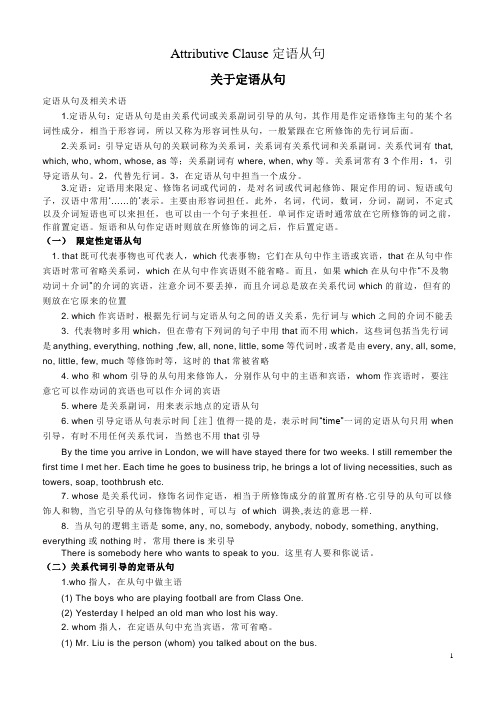attibutive clause 1
Attributive Clause定语全面从句讲解

关系代词的实质
Join the following sentences:
The girl is Mary. We saw her yesterday.
her The girl we saw
yesterday is Mary.
关系代词的实质
Join the following sentences:
1.A plane is a machine that/which can fly. 2.The boy who/that broke the window is called Tom.
the boy =who 关系代词实际上是先行词的复指
the machine = that
3.The boy whose/of which parents are dead was brought up by his grandfather.
(6)As的用法
在定语从句中,一般的从句关系代词是which、 who、whom、that、 whose, 其代替主句中的人 或物,在从句中做主语、宾语或定语。 一、as引导限制性定语从句 主要固定结构有: the same…as , such…as, as…as , so…as, 主句中出现the same, as, such, so修饰先行词,需 选择as做关系代词在定语从句中做主语或宾语。
Who is the girl that drove the car?
Which is the T-shirt that fits me most? (5)当先行词既有人又有物。 They talked about the persons and things that they remembered at school. (6)先行词被all, every, no, some, any, little, much, the only, the very, the last, just, right等修饰。 I’ve read all the books that are not mine. This is the very book that belongs to him.
高一英语必修一 Unit4 定语从句Attributive clauses Ⅰ

whose+n,
=the +n+of +which/whom,
=of +which/whom + the +n
4. Peter lives in the room ___ window opens to the south. A. whose B. that C. which D. of which 5. Please pass me the dictionary ___ the cover is black. A. of which B. which of C. its D. whose
Attributive clauses Ⅰ
定语从句 Ⅰ
一 概念
在英语中修饰n或 pron的成分称为定语,根据定语 出现在n或 pron前后在位置可以将其分为前置定语 和后置定语。 a developing country a kind father a girl in red a boy sleeping in class 一般而言,前置定语经常由单个词充当,而后置定语 则由短语或句子充当,当一个句子充当定语修饰前 面的n或 pron时,就被称为定语从句。
Combine the two sentences to one.
1 I like the girl. The girl lives next door.
I like the girl who/that lives next door. The girl whom/who/that I like lives next door.
3.
It is a poor dog. Its heart is broken. It is a poor dog whose heart is broken.
1.定语从句(形容词性从句)专题讲解

定语从句(Attributive Clause)一关系代词引导的定语从句(who/whom/whose/which/that)1.Who,指代范围是人,句子中充当主语/宾语(限定性定语从句中作宾语可省略)①作主语The boy who is standing there is my cousin.②作宾语The young man(who)Jane loves is standing there.2.Whom,指代范围是人,句子中只充当宾语(限定性定语从句中作宾语可省略)The man(whom) you met yesterday is my teacher.注意:紧接着介词后面作介词的宾语时只能用whom,不用who;如果介词在词尾两者都可以。
①This is the person from whom I learn about news.②This is the person who/whom I learn about news from.不过按照习惯,一般介词都会放在前面,①中那样比较常见。
3.Whose(of whom/of which),指代范围人/物,句子中充当定语①Do you know the boy whose father(the father of whom) is an teacher?②He lives in a house whose windows (the window of which) face south.注意:“介词+关系代词”从句中作定语时被修饰词常常需要提前。
There is a room, the window of which faces the river.4.Which 代指物,句子中充当主语/宾语(限定性定语从句中作宾语可省略)①Children like to read books which have wonderful pictures.②The pen(which) my uncle gave me is missing.注意:which除了指物以外,还可以指代婴儿、动物和表示表示单数意义的集合名词,此外还可以指人的职业、地位或品格等。
英语语法:定语从句(1)

主语;宾语 作宾语可省 主语;宾语 宾语 定语 作宾语可省 可省 不可省
关系代词:
1. who指人,作主语或宾语 (作宾语可省略)
The man who I talked with is our teacher. A person who steals things is called a thief.
限制性定语从句的构成
The old lady who lives next to us sells books. You should do all that I said. I have found the teather whom I am looking for . I visited the factory where my father works. 1.从句位置及语序 先行词 之后,用陈述式语序 “….的” 关系词
The lady is Green. We saw her yesterday.
Who/that
The lady
we saw her yesterday is Green
关系代词的用法
指 代 That Which Who Whom whose 人;物 物
人 人 人、物
所作成分 主语;宾语
是否可省略 作宾语可省
先行词 关系词 从句
which、that 是关系代词,它在从句中代替 先行词the building,同时担任从句中的主语, 也起连词的作用,把两个简单句连接 起来。
限制性定语从句与非限制性定语从句 The Restrictive Attributive Clause 限制性定语从句(无逗号)
定 语 从 The Non-Restrictive Attributive 句 Clause 非限制性定语从句(有逗号)
英语翻译与写作-Attributive Clauses

Attributive ClausesI. 英汉定语结构的对比英语的定语从句呈右开放状,从理论上讲,一个句子可以向右无限扩展。
This is the cat that killed the rat that ate the cake that was put in the house that Jack built. 汉语没有定语从句之说,作为修饰成分的定语习惯上放在被修饰词之前(左边),用“、、、、、、的”结构表现,呈左封闭状。
这就是那只捕杀了偷吃了放在杰克修建的房间里的蛋糕的老鼠的猫。
如果“、、、、、、的、、、、、、的”太多,就会不知所云,影响对整个句子的理解。
这就是那只捕杀了老鼠的猫。
老鼠偷吃了放在屋里的蛋糕。
屋子是杰克盖的。
II. 限制性定语从句1. 合并法(combination):在定语从句较短的情况下(一般在10个词之内),将定语从句合并于主句,用“、、、、、、的”结构译出。
1)The people who worked for him lived in mortal fear of him.2)Pollution is a pressing problem which we must deal with.3)July and August are the months when the weather is hot.4)In the room where the electronic computer is kept, there must be no dust at all.2. 分译法(division):即化整为零,分别翻译。
这种方法比较适合长而复杂的定语从句。
分译时,可以重复先行词。
1)Each day we make choices that affect our lives and sometimes the lives of others.2)They are striving for the ideal which is close to the heart of every Chinese and forwhich, in the past, many Chinese have laid down their lives.3)Between these two particles, the proton and the electron, there is a powerfulattraction that is always present between negative and positive electric charges.4)Newton invented a paper lantern illuminated by a candle which he carried with himto light his way to school on dark winter mornings.在主题明确的情况下,也可以不重复先行词。
U1Attributiveclauses

is eating her flowers.
(主语)
These are the trees.
The trees were planted last year. These are the trees which/that were planted last year.
Some of the books were gifts.
He got the gifts from his Chinese friends and
students.
(宾语)
Some of the books were gifts (which/that) he got from his Chinese friends and students.
The paintings are being shown in the exhibition room.
• It is no longer the small town that it used to be.
• She has a brother whose name I can’t remember.
• The school where he studied is in Shenzhen.
The boy is Tom. The boy is smiling. The boy who/that is smiling is Tom.
Main clause & the attributive clause
• Mary is a student who is 21 years old. ( 主句部分 ) ( 从句部分 )
• He who laughs last laughs best. ( 从句部分 )
定语从句(attributive clause)

Please tell me the reason why you missed the phone. I don’t know the reason why he looks unhappy today.
我住在纽约的那个兄弟有6个孩子。(可能还有其他兄弟)
My brother, who lives in New York, has six children.
我弟弟有6个孩子,他住在纽约。(只有这一个兄弟)
引导定语从句的关系副词有when, where, why • when 指时间,在定语从句中作状语,也可用on which 代替
• 当先行词指“物”时,在定语从句中可以作主语, 也可以作宾语,关系代词用which/that • A dictionary is a book which gives the meaning of words.
A plane is a machine that can fly. Let’s ask the man that is reading the book over there.
Is this watch which he is looking for? The old man whom the nurses are looking after is very well now.
含有介词的动词短语,介词一般仍放在动词的后面, 不分开
Tom came back, which made us happy. I said nothing, which made him very angry.
• 当先行词指“人”时,在定语从句中作宾语时, 关系代词用whom. • The man whom I telephoned is out.
Unit+1+Attributive+Clause课件人教版(2019)选择性必修第一册

2.限制性定语从句和非限制性定语的区别
1. In the class there are ten students who/that speak English very well.
翻译:这个班有10名英语说的好的学生
含义:限制性,班上不只有10名学生,但只有这10名学生英语说得好 形式 : 没有逗号
3. Do you know the reason why the sky is blue?
4. She's the person whose daughter goes to Harvard.
若去掉,句子含义不明确 从句起限定作用,缩小范围 无逗号与主句隔开
非限制性定语从句
1. Paris, where I spent six months studying, is the most
2. 关系副词-----非限制性定语从句
(1) 关系副词 when 在非限制性定语从句中作时间状语, 指 代主句中表示__时__间____的词语。
(2)关系副词 where 在非限制性定语从句中作地点状语, 指代 主句中表示__地__点____的词语。
(3) when / where 有时可以换成“介词十 which”。
(which / that) I like to read. 3) Is there anyone in your class __w_h_o_s_e__ (which / whose)
family is in the city? 4) Football, __w_h_i_ch___ (which / that) is a very interesting
【语境应用】完成句子。 1) The foreign guests, __w__h_o___ (who / that) were
ATTRIBUTIVE_CLAUSE1

2.插入式定语从句,即在关系代词和从句之间 插入一个句子
1.I sugggest you choose someone who you think is kind and friendly. 2. He made another great discovery, which I think is very important to science. 3.This is Mr.White, who I think has something interesting to tell you.
4.The poor man has no house in which to live.
5. The beggar has no money with which to buy food. 6. Frank’s dream is to have his own garden in which to produce many beautiful flowers.
3. As we all know, China is a developing country. As is known to all, China is in th east of Asia.
4. I want to read such a book as you read. the same book as you read.
1.he had to face the condition where pressure was heavy. I’ll show you the point where you fail. There are always occasions when you know you should do something but you don’t.
theattributiveclause--定语从句 (1)

The Attributive Clause定语从句一. 定语从句: 用于修饰名词的从句叫定语从句。
二. 先行词:被定语从句所修饰的名词叫先行词。
三. 关系词:引导定语从句的引导词叫关系词。
(关系词用来指代先行词并在定语从句中作成份)关系词分为:关系代词:who, whom, which, that, whose, as关系副词:when, where, why,(that)四. 关系词在定语从句中的句法作用:关系代词:做主语,宾语,表语。
关系副词:做状语。
五.定语从句用法:先行词关系词从句中的成份1 人who/that 主语(whom/that/who) 宾语/介宾介词+whom (介宾)2 事/物that/which 主语(that/which) 宾语/介宾介词+which (介宾)3 人/事/物whose=of which=of whom定语4 地点where=in which 状语that/which(同2) (主语/宾语)5 时间when=on which 状语that/which(同2) (主语/宾语)6 原因why=for which 状语that/which(同2) (主语/宾语)7 方式(way)that =in which 状语that/which(同2) (主语/宾语)8 被such和the same 修饰as (主语/宾语) 例:1. The boy who/that broke the window is called Tom. (who=the boy) The girl (that / who)we saw yesterday is Mary. (that / who= the girl) The man (that/ who/whom)you spoke to was a scientist.→The man to whom you spoke was a scientist.The old man whom I am looking after is better. (look after为固定短语,不提前)2. A plane is a machine that can fly. (that=the machine)Is this the watch (that/which)you are looking for? (look for为固定短语,不提前)3. The boy whose parents are dead was brought up by his grandfather. (whose= the boy’s)The boy whose handwriting is the best in his class is Peter.→The boy the handwriting of whom is the best in his class is Peter.→The boy of whom the handwriting is the best in his class is Peter.The house whose window is broken is mine. (whose=the house’s)The house the window of which is broken is mine.The house of which the window is broken is mine.**Our class has 45 students, most of whom are boys.**The Chinese teams won 20 gold medals, 12 of which were won by women.(12 of which=12 of the 20 gold medals)**The man has two sons, both of whom are college students.(both of whom=both of the two sons)4. The school where I study is far from my home.(where =in the school) This is the house where I lived last year.Where=in the house; where =in whichThe city (that/which)she lives in is far away.5. I still remember the day when I came here.when =on the day; when=on which6. There are many reasons why people like traveling.why =for the reasons; why=for which7. I don’t like the way (that) you speak.that =in the way; that =in which8. This is the same pen as I lost. 这本书和我丢的那本一模一样。
初中英语语法之——定语从句

注意:当先行词指人时,偶尔也可用关系代who, 如: / whohas a sense of duty won’t 1) Any man that __________ do such a thing. 任何有责任感的人都不会做这样的事。 2)All the guests___________ that / whowere invited to her wedding were important people. 所有应邀来参加她婚礼的客人都是重要人物。
四. 修饰物体时关系代词that和 which的区分 (一)不用that的情况 1. 在引导非限定性定语从句时。 1)The tree, that is four hundred years old, 错 is very famous here. (___) 2)The tree, which is four hundred years old, is very famous here. (____) 对 2. 介词后不能用。 which get 1) We depend on the land from ______we our food. that/which 2) We depend on the land _____________we get our food from.
2.当先行词被序数词修饰时。如: that they visited in London was The first place ______ the Big Ben. 在伦敦他们参观的第一个地方是大本钟。 3.当先行词被形容词最高级修饰时。如: This is the best film______ that I have ever seen. 这是我看过的最好的电影。
合并为一个句子
定语从句(attributive clause)

(2).在there be 结构中,并且先行词 是人;
who asks for There is a young man _____ your help.
7. whom指人,是宾格,作宾语 (介宾短语) (1). The person to whom you just talked is Mr Li. =The person who/whom/that you just talked to is Mr Li. (2). Mrs Read is the person to whom you should write. =Mrs Read is the person who/whom/that you should write to.
8.whose是who的所有格,用作名 词的限定语,先行词可以是人也可 以是物。 (1). This is the scientist whose name is known all over the world. (2). Would you please pass me the book whose cover is blue?
定语从句 (The Attributive Clause)
高一
Review: 定义: 在复合句中,修饰名词
或代词的从句叫做定语 从句。(P90)
1.分类
(1)限制性定语从句: 作定语,修饰先行词(名词/代词)。 译为定语“......的” (2)非限制性定语从句: 作定语,修饰先行词(名词/代词)或前面 整个句子。 主句和从句中有逗号。
(3).有人、物同时作先行词时;
eg: The old woman scolded (骂) her that grand-daughter and her dog ____ broke her glasses.
Attributive_Clause限制性定语从句

Attributive Clause定语从句关于定语从句定语从句及相关术语1.定语从句:定语从句是由关系代词或关系副词引导的从句,其作用是作定语修饰主句的某个名词性成分,相当于形容词,所以又称为形容词性从句,一般紧跟在它所修饰的先行词后面。
2.关系词:引导定语从句的关联词称为关系词,关系词有关系代词和关系副词。
关系代词有that, which, who, whom, whose, as等;关系副词有where, when, why等。
关系词常有3个作用:1,引导定语从句。
2,代替先行词。
3,在定语从句中担当一个成分。
3.定语:定语用来限定、修饰名词或代词的,是对名词或代词起修饰、限定作用的词、短语或句子,汉语中常用………的‟表示。
主要由形容词担任。
此外,名词,代词,数词,分词,副词,不定式以及介词短语也可以来担任,也可以由一个句子来担任.单词作定语时通常放在它所修饰的词之前,作前置定语。
短语和从句作定语时则放在所修饰的词之后,作后置定语。
(一)限定性定语从句1. that既可代表事物也可代表人,which代表事物;它们在从句中作主语或宾语,that在从句中作宾语时常可省略关系词,which在从句中作宾语则不能省略。
而且,如果which在从句中作“不及物动词+介词”的介词的宾语,注意介词不要丢掉,而且介词总是放在关系代词which的前边,但有的则放在它原来的位置2. which作宾语时,根据先行词与定语从句之间的语义关系,先行词与which之间的介词不能丢3. 代表物时多用which,但在带有下列词的句子中用that而不用which,这些词包括当先行词是anything, everything, nothing ,few, all, none, little, some等代词时,或者是由every, any, all, some, no, little, few, much等修饰时等,这时的that常被省略4. who和whom引导的从句用来修饰人,分别作从句中的主语和宾语,whom作宾语时,要注意它可以作动词的宾语也可以作介词的宾语5. where是关系副词,用来表示地点的定语从句6. when引导定语从句表示时间[注]值得一提的是,表示时间“time"一词的定语从句只用when 引导,有时不用任何关系代词,当然也不用that引导By the time you arrive in London, we will have stayed there for two weeks. I still remember the first time I met her. Each time he goes to business trip, he brings a lot of living necessities, such as towers, soap, toothbrush etc.7. whose是关系代词,修饰名词作定语,相当于所修饰成分的前置所有格.它引导的从句可以修饰人和物, 当它引导的从句修饰物体时, 可以与of which 调换,表达的意思一样.8. 当从句的逻辑主语是some, any, no, somebody, anybody, nobody, something, anything,everything或nothing时,常用there is来引导There is somebody here who wants to speak to you. 这里有人要和你说话。
定语从句关系代词thatwhichwhowhomwhose1.That指人物,作主语

(5). 先行词既有人又有物 He talked about the teachers and schools that
he had visited.
The singer is Sunyanzi. Her/ Sunyanzi’s songs are popular
3.Relative Pronouns(关系代词):连 接先行词和定语从句的词,一般紧跟在 先行词的后面,在从句中充当主语,宾语 等。
The lady who is standing there is my English teacher. 先行词 关系代词 (主语)
主句: The lady is my English teacher.
Attributive Clauses 定语从句 I
站在那儿的女士是我的英语老师.
The lady who is standing there is my teacher. 先行词 关系代词
The Attributive Clause(定语从句)
1.定义: 定语是句从句叫定语从句。
2. Precedent (先行词):定语从句所修 饰的名(代)词叫作先行词。
The dress that she is wearing is new. which Ø
(3) He is the kind person. I have ever worked with him.
He is the kind person that I have ever worked with. whom Ø
This is the boy behind whom I sit.
他是一个会说英语的老师. He is the teacher who can speak English. 你认识今天来拜访你的那个人吗? Do you know the man who came to visit you today? 你认识今天你要去拜访的那个人吗? Do you know the man whom you will visit today?
定语从句(1) 关系代词的用法

下列情况下只能用which引导定语从 句,不能用that:
(1)关系词前有介词 例:The school in which he once studied is very famous. 他曾就读的学校非常出名。 (2)引导非限制性定语从句 例:He had failed in maths exam,which made his father angry. 他数学考试没及格,这让他父亲很生气。
四.that的用法 例:1. All that glitters is not gold. 2. As long as you stand up to the difficulties , there are none that cannot be overcome. 3. You can take any book (that) you like. 4.Is anything that I can do for you? 小结that的用法
在复合句中,修饰某一名词或代词的 从句叫做定语从句
She is the girl who can speak English very well.
先行词 引导词
定语从句概述 两个重要概念:先行词和关系词
1.先行词:被定语从句修饰或限制的对象 2.关系词:指代先行词、起连接主句和从 句的作用,并且在定语从句中充当一定 成分的连词。 3.主句和从句:I don’t like the people who are never keep their words.
三.which 的用法
Eg.1.
We are studying sentences. They contain attributive clauses.
Attributive clause1

Attributive clauseLesson 1Teaching Aims and Demands1.Get the students to know the function of the sentences.2.Get the students to know what is clause, what is attributive clause, and the function of attributive clause.3.Learn the sorts of attributive clauses and the sorts of the relative words.4.Learn the function of relative wordsThe important points1.The function of sentences.2. The relative wordsThe difficult points1.The function of sentences.2.The sorts of attributive clauses and the sorts of the relative words.Teaching MethodsCommunication way of teaching, discussion and group work.一、句子1、句子分为单句和复句(复合句)2 、单句有四类:陈述句、疑问句、祈使句、感叹句。
3、复句有两类:并列复合句、主从复合句4、并列复合句由and. or .but .so .yet .for .while 等引导。
He is 45 and my brother is only 32.You should study hard or you will fail.你得努力用功,不然你就完了。
I have found my bag everywhere , but I can’t find it.我到处找我的包,可没找到。
Attributive clause (限制性定语从句)

定语从句的辨认(思考步骤)
找出先行词
a.确定在从句中关系代词的人称、数和性。 b.确定定语从句的位置
确定关系代词在从句中的成分以确定关系代词的格
确定从句的时态 (定语从句的时态都不受主句的限制)
关系代词的使用方法
定语从句常用的关系代词有:that 、who(m)、whose、which等。 1. that多指物,在从句中作主语或作动词的宾语。(that/which作宾语时
Which is the bike that you lost?
Who is the woman that was praised at the meeting?
从例句中看出,who、that在许多情况下可以通用,但有时宜用
用who,而不用that 1.先行词是one(s),anyone,someone, those时,关系词使用who Those who want to go to the Great Wall sign up here. One who has nothing to fear oneself dares to tell the truth. 2.在there be 句型中,先行词指人,关系词用who
固定动介词组不可分割,介词不能提前.例如:look after,look at …
3 )The room (that) I live in is very big.
The room (which) I live in is very big. The room in which I live is very big.
2) He knew the teacher who we met yesterday. He knew the teacher whom we met yesterday. He knew the teacher (that) we met yesterday. 4.whose 是代词的所有格形式, 它既可以代人也可以代物。 I saw a woman . Her bag was stolen . I saw a woman whose bag was stolen. Please show me the book . Its cover is red. Please show me the book whose cover is red.
- 1、下载文档前请自行甄别文档内容的完整性,平台不提供额外的编辑、内容补充、找答案等附加服务。
- 2、"仅部分预览"的文档,不可在线预览部分如存在完整性等问题,可反馈申请退款(可完整预览的文档不适用该条件!)。
- 3、如文档侵犯您的权益,请联系客服反馈,我们会尽快为您处理(人工客服工作时间:9:00-18:30)。
attibutive clause 1.ppt句子的最基本的要素是要有主语和谓语,在祈使句中主语可以省略。
We all listened.She likes sports.My father is a doctor.He told us a funny story.I asked them to clean the classroom.Stop talking.在一个句子中有两个主谓结构,而其中一个主谓结构又充当了句子中的某一成分,则整个大句子就叫作复合句,而其中充当了某一成份的句子就叫作从句。
My father was a teacher when he was young.He told me that he had already finished his homework.什么是复合句?什么是从句?这个句子是复合句吗?The children are playing and the teachers are having a rest.并列句He is a teacher with a beautiful voice.He is an English teacher who likes singing songs.前置定语an experienced nursethe exciting news后置定语the man in yellowthe rich woman killed yesterdaythe girl crying by the road有些形容词习惯上做后置定语all presentthe greatest man alivethe man asleep/awake定语从句当定语是一个句子时,我们称之为定语从句Attributive Clause(定语从句)概念在复合句中,修饰某一名词或代词的从句叫做定语从句先行词(Antecedent):被定语从句所修饰的词。
关系词(Relatives):引导定语从句的词,并代替先行词在从句中担任一定的成分。
限制性定语从句非限制性定语从句He who doesn’t reach the great wall is not a true man. 定语从句先行词引导词引导词关系代词 :who﹑whom﹑that﹑which﹑whose关系副词:where﹑when﹑why关系副词关系代词关系词在句中作用先行词所指关系词whichwho whom whoseaswhen wherewhy人/物物人人人/物人/物/事情时间地点原因主、宾、表主、宾主、宾宾主、宾、表时间状语地点状语原因状语关系词的作用:1、连接作用把主句和从句连接起来2、替代作用在从句中代替在它前面的先行词3、成分作用在从句中充当一个成分The girl (who is standing there ) is Mary.Relative pronounantecedentThe girl is Mary. / She is standing there.How to combine two sentences into an attributive clause?1、找准主句,并确定先行词。
2、找准关系词,来代替先行词Practice:The boy is Tom. He sits in front of me.The boy (who sits in front of me ) is Tom.The teacher will give us a speech .We met the teacher yesterday.The teacher (whom we met yesterday )willgive us a speech.The girl who/that is standing there is Mary.She is the girl( who/whom/that )I met that day.The doctor to whom she sent her friend is very famous.(1)指人的关系代词:who/that(主语)who/whom/that(宾语,可省略)介词之后只能用whom2. which 指物,作主语或宾语 (作宾语可省略,如介词提前则不能省)These are the trees which were plantedlast year.This recorder (which) he is using ismade in Japan.Is this the library (which) you borrow books from?Is this the library from which you borrowbooks?The man is an old teacher.He lives next door to me.The man who/that lives next door to me is an old teacher.(主语)〓 The woman got the job.We saw her on the street.The woman( whom/who/that )we saw on the street got the job. 〓 The boy is in the lab.You want to talk to him.The boy (whom/who/that )you want to talk to is in the lab.The boy to whom you want to talkis in the lab.〓 This is the boy. I sit behind him.This is the boy (whom/who/that ) I sit behind.This is the boy behind whom I sit.〓 I know the boy.His father is a doctor.I know the boy whose father is a doctor.I like the house.Its windows face south.I like the house whose windows face south.1 为以下情况时,只用who,不用that当先行詞是those / she / he / they /one/ones/everyone/nobody/anyone等代詞时,关系代詞用who.Those who were late for class raise your hands.AttentionHe who doesn’t go to the Great Wall is not a true man.b.在there be 开头的句中用who指人There is a man who wants to see you at the school gate.为以下情况时,只用that, 不用who在以who开头的特殊疑问句时,为避免重复Who is the girl that is crying?2 that 和which的区别I gave her everything that I had.The first thing that we should to is to find a room to live in.It is the largest map that I have ever seen.He is the very person (that) I want to see at the present.They are talking about the people and things that they have seen in the country.Which of the books that were borrowed from the library is yours? There is a seat in the corner that is still free.在以下情况中通常用that而不用which先行词为all, few, little, much, everything, nothing, anything, none, 等不定代词时;先行词有all, any, every, each, few, little, no, the very,the only, the last修饰时;先行词有序数词修饰时(first);先行词有最高级修饰时(best);先行词既有人又有物时;主句是which, who引导的特殊疑问句,不用以免同形重复主句以there be 开头,先行词指物.Tom is not the boy that he used to be.当关系代词在定语丛句中作表语3 在以下情况下必须用which关系代词直接在介词后作宾语时,引导非限定性定语从句时用which而不用that。
His uncle works in a factory in which bikes are made.His speech, which bored everyone, went on and on.4 关系代词的省略关系代词在从句中作宾语时可以省略( that, which, who)关系代词在从句中作主语时不可以省略非限定性定语从句中的引导词不可以省略。
The question (that/which) I don’t understand is about grammar.I gave him a bottle of beer, which he drank at once.My father, who works in a factory, used to be a soldier.5 表示人时,介词后不可用who, that。
只能用whom.但如果将介词放在从句的句中,就可以用who或that来替代 ,且whom, who, that ,都可以省略。
The person to ___ you talked is Mr. Li.The man ____ I saw last week is called Smith. The person ______ you talked to is Mr. Li.(who/ whom/that)whom(who/ whom/that)6 关系代词----whosewhose可以修饰人也可修饰物,在定语从句中作定语。
